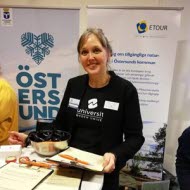Human Geography
Human geography is a social science subject that studies the interaction between people, society and the environment at different levels; from the individual level to the local, regional, national and global levels.
Human geography is about understanding and placing phenomena in sometimes very complex and changing contexts. A starting point in human geographical studies of society is that space, for example in the form of spatial differences and conditions, plays a crucial role and has its own explanatory value.
Human geography encompasses several different sub-disciplines. Mid Sweden University has focused its education on economic geography, political geography and planning, as well as the geography of mobility. Economic geography deals with the economic structure and spatial distribution of society and business. In this context, attention is paid to both the processes that create and maintain economic globalization and an international division of labor, as well as the locally specialized cluster. A particular focus is on the economic geography of tourism, where the power relationship between international tourism operators and the local community's opportunities for economic, social and ecological development and sustainability is discussed.
Another focus area is mobility, transport and communications, which are important prerequisites for connecting nodes in a global economy. Globalisation and our ever-increasing demands for the mobility of people, goods, capital and information require an insightful and sustainable development of infrastructure and transport apparatus. In this context, it also discusses the opportunities of different groups (rural and urban, women and men, tourists and migrants) to be part of, and to control or be subject to, global flows.
In political geography, various political phenomena, their spatial organization and distribution are studied. An example of this is the actions of states based on conditions, such as geographical location, resources and population distribution. Political geography discusses, among other things, the nation-state and how it is maintained over time, the function of the nation-state in the political superstructure of the world economy and in times of globalization, nationalism and terrorism, imperialism and colonialism, as well as the relationship between center and periphery at different scales. With regard to the planning approach, this includes the Swedish planning and management system, regional and local development in cities and sparsely populated areas, physical planning and resource management. The task of community planning is to weigh up political and economic demands and conditions in order to manage, refine and renew society's cultural and natural resources.
Fristående kurser i Kulturgeografi
Employees at the subject human and economic geography








